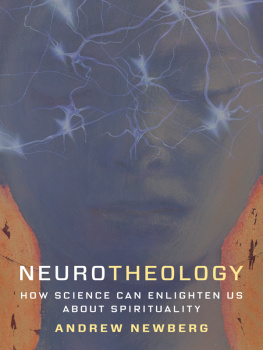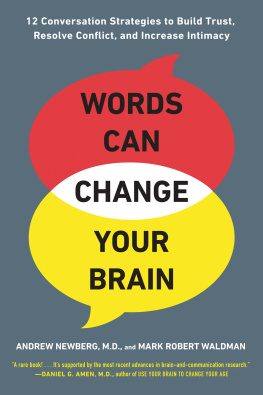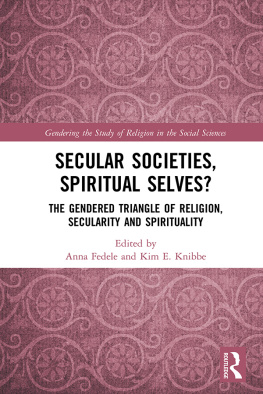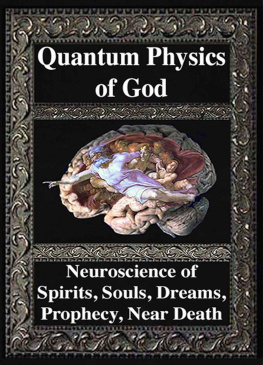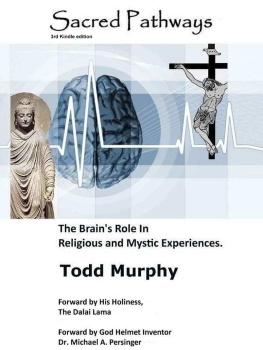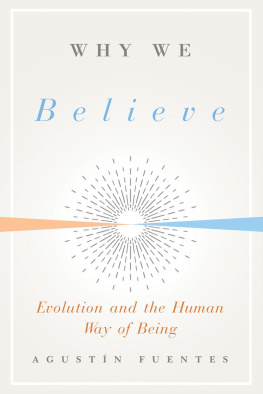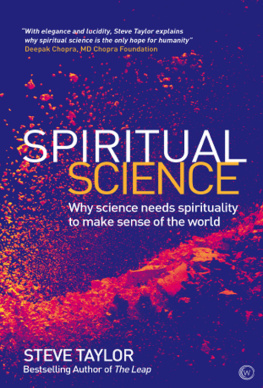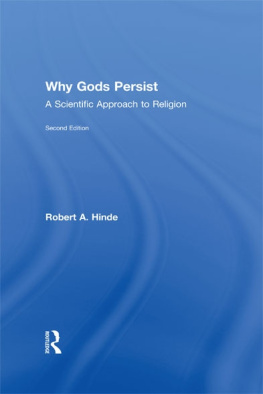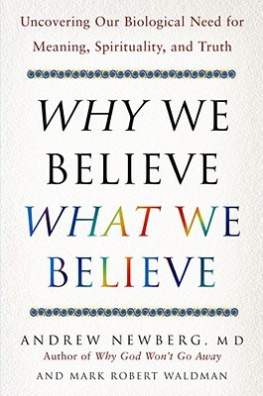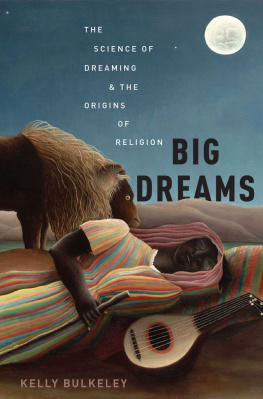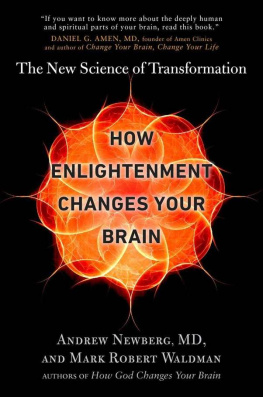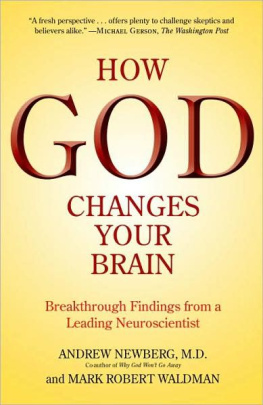Contents
NEUROTHEOLOGY
Neurotheology
HOW SCIENCE CAN ENLIGHTEN US ABOUT SPIRITUALITY
Andrew Newberg
Columbia University Press
New York
Columbia University Press
Publishers Since 1893
New York Chichester, West Sussex
cup.columbia.edu
Copyright 2018 Andrew B. Newberg
All rights reserved
E-ISBN 978-0-231-54677-5
Library of Congress Cataloging-in-Publication Data
Names: Newberg, Andrew B., 1966 author.
Title: Neurotheology : how science can enlighten us about spirituality / Andrew Newberg.
Description: New York : Columbia University Press, [2018] | Includes bibliographical references and index.
Identifiers: LCCN 2017044209 (print)| LCCN 2017052056 (ebook) | ISBN 9780231546775 (ebook) | ISBN 9780231179041 (cloth : alk. paper) | Subjects: LCSH: NeurophysiologyReligious aspects. | BrainReligious aspects. | Spirituality. | Psychology, Religious.
Classification: LCC QP355.2 (ebook) | LCC QP355.2 .N57 2018 (print) | DDC 612.8dc23
LC record available at https://lccn.loc.gov/2017044209
A Columbia University Press E-book.
CUP would be pleased to hear about your reading experience with this e-book at .
Cover design: Lisa Hamm
Cover image: Digital composite: Jane MacNeill, Moment 1, oil on board, 1999, Pete Nahum at The Leicester Galleries, London/Bridgeman Images; and Pasieka/Science Source
CONTENTS
THE QUESTIONS
Can we determine why some people are devoutly religious whereas others are complete atheists? What research can explain both the beneficial and detrimental effects of religion on the health and well-being of individuals, societies, and all of humanity? How can we explain the tenacity of religion in virtually every culture and age? How might we determine if religious people are crazy in a particular way or just the same amount of crazy as everyone else? What perspective can we take to understand the profound impact of spiritual and mystical experiences on a persons life? Is there a path we might take that can provide novel insights into the nature of our world and the nature of reality? What new field of scholarship may dominate our world over the next century?
Perhaps each of these questions can end with a single answer: neurotheology. As someone involved in the field of neurotheology for the past twenty years, I feel like we are at the very beginning stages of acquiring a type of knowledge that just might revolutionize our understanding of ourselves and our world.
I started my journey as a child, asking many questions about the nature of reality and how we, as humans, can understand that reality. I initially realized the importance of the human brain as the part of ourselves that helps guide our experiences, emotions, and thoughts toward an understanding of the world. But as I began to study the science of the brain, I started to realize that there were some important limitations. Science seemed to have trouble nailing down our subjective experiences of the world. In fact, since all our thoughts and feelings occur in the mind, how can a scientific observer ever truly know what a person thinks or feels? And when it comes to consciousness, that mysterious self-reflective understanding of our own mind, science struggles even more. So I started to spend time thinking about these issues in what might be called a philosophical meditation. I pondered how my own mind, and brain, was trying to understand reality. In the midst of my personal reflections, I came to understand the importance of different experiences of reality and different states of consciousness, even mystical ones. It was this combination of philosophical and scientific investigations that ignited my personal interest in a more interdisciplinary approach to the big questions. I also realized that such an approach mirrored how humanity itself dealt with the world.
For thousands of years, the history of humanity has been guided by two primary forces. One is science and technology. It is believed that the evolutionary expansion of the human brain primarily supported the development of tools, which enabled humans to survive more effectively than any other animal on the planet. And since our first flint rock, we have continued to use science to explore and navigate through our world. From the first hearths, to the cultivation of land, to the wheel, to the printing press, to the automobile and the computer, the force of science has perpetually advanced humanity and human knowledge.
The second primary force in human history has been religion and spirituality, also a method for trying to understand our world, but from a radically different perspective than science. Religion and spirituality have existed within human societies from ancient times, from the first burial rites, to the pyramids, the Upanishads, the Bible, the Quran, and to the present day. Religion has played an essential role in the development of every civilization on Earth. Today, many describe themselves as spiritual but not religious; thus it seems that spirituality is reflected in many peoples goal of connecting to the world in a meaningful way.
As many have pointed out, the problem with religion and spirituality on one hand and science and technology on the other is that they seem generally oppositional to each other. One is empirical; the other is doctrinal. One is objective; the other personal or social and cultural. One trusts humans to figure out the world; the other trusts God. And in many instances, the oppositional relationship between religion and science seems validated; for example, evolution versus creationism, cosmology versus theology, and moral reasoning versus moral doctrine. In each circumstance, there seems to be little room for mutual interaction. Today, many of the same arguments persist with no clear end in sight.
However, these two forces do not necessarily have to be oppositional, as has been pointed out by a number of scholars. In ancient times, they were intimately intertwined. The building of many of the great religious structures, such as Stonehenge and the Egyptian pyramids, was based on highly developed engineering and guided by the mathematical and observational analysis of astronomical cycles. It seems that for human cultures until the Middle Ages, an understanding the universe was tantamount to understanding God. Since that time, especially since the Enlightenment, there has been a growing gap between religion and science.
Where will this opposition lead? One possibility seems to be the inevitable loss of one of these forces. In our current time, it is not clear which might ultimately win. While science has advanced to staggering heights, there are still billions of individuals who insist on adhering to religion. Many conflicts around the world have a strong religious component. And if we are to give credence to evolutionary theory, whichever force, science or religion, ultimately results in persistent adherence and followers will be the one that survives.
But what if there were an alternative? What if there were a way in which science and religion could come together, in small yet complex ways, that might lay the foundation for greater cooperation in the future? Is it possible that science and religion could interact sufficiently to help bring all of humanity closer to a deep and fulfilling understanding of ourselves and the world? What would this approach look like?

